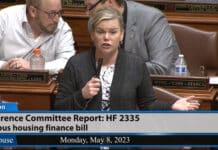WASHINGTON – A bill to stop the expansion of Metropolitan Planning Organizations (MPO’s) passed the Transportation & Infrastructure committee in the United State House of Representatives Wednesday, pushing it one step closer to being signed into law.
The bill is the work of Rep. Jason Lewis (R – MN02) and Rep. Dan Lipinski (D – IL03). The Lewis-Lipinski bill was crafted in response to a Department of Transportation (DOT) rule enacted the day before President Donald Trump took office which allowed MPO’s, like the Metropolitan Council in Minnesota, to expand their boundaries to any contiguous area that could be urbanized within 20 years for federal transportation planning and related housing issues.
In some instances, the new MPO boundaries would stretch over state lines or would force existing MPO’s to merge into one entity. Lewis’ bill rejects the DOT rule.
“Under the rule, the Met Council, a MPO, could have expanded their boundaries and taxed the suburbs to help fund downtown projects,” said Lewis. “We’re protecting the ability of local decision makers to do what works for their own communities.”
The Center of the American Experiment (CAE) says the DOT rule would not have immediately affected the Twin Cities due to it not making the list of urbanized areas based on the 2010 census. However, CAE says the Met Council was a step ahead of the DOT rule, explaining in an article, “But here is the odd thing: the Met Council is already doing transportation planning in Wright and Sherburne Counties under an agreement signed in 2014. Those counties are outside of the seven-county metro area. That needs to get sorted out.”
The Lewis-Lipinski bill should continue to make smooth headway in the Republican-held Congress. The Congressional Review Act enables Congress to repeal final rules from federal agencies with a majority vote in both chambers and the President’s signature.
The Lewis-Lipinski bill passed the committee unanimously. The bill has already passed in the United States Senate.
Have a news tip? Email us at pbagnpghf@nycunarjfza.pbz

















